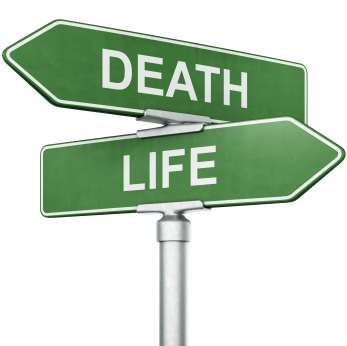Imagine you’re about to present to your bosses and colleagues at work, take an exam in school, play in the finals of a tennis tournament, or ask someone to marry you. A man comes up to you, shows you a gun, and tells you that if you don’t succeed, he will shoot you dead.
How will you feel? Terrified, I would assume. And how will you perform? Poorly, I would suspect. What is the likely outcome in these situations? Well, failure. Though this violent example may be a bit impolitic given the epidemic of shootings that currently plagues our country, I believe it illustrates a painful psychological trap you can place yourself in. Specifically, you approach these life situations as life-or-death experiences.
Of course, there is no one waiting for you after who will shoot you physically dead if you fail. Clearly, these situations aren’t a threat to you physically; failure won’t result in your physical death. Yet, you respond as if your physical life is on the line. In these situations, despite being a highly evolved beings, you quickly revert back to our primitive ancestors roaming the Serengeti 250,000 years ago when we first officially became homo sapiens. In response to the perception that your life is in danger, your survival instinct is triggered, your fight-or-flight reaction is activated, and your mind and body go into DEFCON-1 mode for maximum readiness and immediate reaction, all to ensure you live to see another day. All this despite the fact that you will live to see another day regardless of the outcome of these modern-day experiences.
What is interesting, though I suppose not surprising, is that our limbic system hasn’t evolved sufficiently in the last quarter-of-a-million years (a snap of our fingers in evolutionary time) for it to distinguish between a threat to our physical survival that was ever-present in primitive times and the failures, rejections, and setbacks that can cause considerable psychological and emotional discomfort but are hardly life threatening.
Returning to the gun example, what these reactions mean is that there is someone who you think will shoot you psychologically dead should you fail in some way that you perceive as threatening. As an adult, that person is most likely you or perhaps your parents or someone else of great importance and influence in your life. There are three psychological deaths and a practical death that can result from such a failure.
First, a perceived failure of some sort in an area in which you are highly invested can cause our self-identity (our answer to “Who am I?”) to experience a form of death. For example, let’s say that a significant part of your self-identity is comprised of your conception of yourself as an ambitious businessperson climbing the corporate ladder. You apply for a promotion, but someone else is chosen. This blow can threaten your self-identity as a successful businessperson with much to offer, leading to the feeling that your psychological life is at risk.
Second, a perceived failure can be even more threatening to your self-esteem, that is, whether you deem yourself a worthwhile person. Clearly, a setback in an important area of your life can be a significant threat to psychological life to the extent that you may question your value as a person which can have a cascading effect on all aspects of your life.
Third, you invest yourself in goals that you hold dear, whether educational, professional, athletic, or personal. As a goal-oriented being, any experiences that stymie your pursuit of those goals can feel like psychological death. Every time you put your goals to the test, you can feel that you are putting our life on the line. If you achieve your goals, you “live,” if you don’t, you “die.”
There is also a practical death that can occur in the face of some type of failure. What I mean by ‘practical death’ is that your life can change in ways that you don’t want to happen. You aren’t admitted to the college of your choice, you don’t qualify for the Olympics, you don’t get the job you covet, or the person you love doesn’t say “I do” when you pop the question. In other words, in viewing life experiences as life-or-death, you will believe that, with these setbacks, your hopes and aspirations will die.
Paradoxically, when you make your life experiences not a life-or-death, but rather just a part of life, two remarkable things happen. First, with the pressure that you feel to succeed and the fear that you feel for failure removed, you are actually liberated to perform to the best of your abilities, which makes success more likely. Additionally, not only is the pursuit of your life goals more enjoyable (living in a constant state of life-or-death is decidedly not pleasant), but you’re more likely to get what you want.
Second, on those occasions when life doesn’t work out as you had wanted, you are able to accept them with a greater degree of equanimity. Of course, you will be disappointed because you perceive it as a failure of the experience, but you aren’t devastated because you don’t perceive it as a failure of the self. In other words, whatever life throws at you, and often life can throw an awful lot in your direction, you know that, in the vast majority of circumstances, you will be okay. And with that piece of mind comes the freedom to continue to explore, risk, and live life to its fullest.
Finally, by surviving these small “deaths” without their feeling as if they are life or death, you will come to realize that life has its ups and downs, some slight and some more severe. Yet, with each of these experiences, sometimes involving hitting rock bottom, there are valuable lessons to be learned and opportunities to rise again and continue to pursue life with passion and vigor and without fear or hesitation. And with this approach to life, a lot of very good things will likely happen to you.







